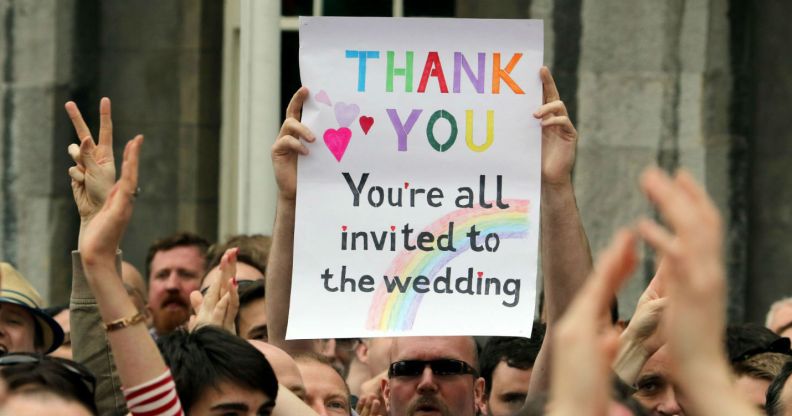Here’s what you need to know about getting married in Ireland

The first same-sex weddings begin today in Ireland. Fancy taking the leap yourself? Confused to whether you can? Here’s everything you need to know.
The Republic of Ireland approved same-sex marriage in a landslide referendum earlier this year, by 62.07% to 37.93%.
After months of preparations and overcoming bureaucratic hurdles, the green light has been given for weddings to start from 2:15 PM this afternoon.
However, it’s not as simple as that for everyone – what if you’re already in a civil partnership? What if you have a civil union from elsewhere in the world? What if you live abroad?
Luckily, Ireland’s Gay & Lesbian Equality Network (GLEN) has you covered.
The group has produced a handy infographic detailing seven different scenarios – though the bad news is, if you haven’t already declared your intent to marry, you will still have to wait a few months.
Check out the graphic below (click to enlarge)

Kieran Rose, GLEN Co-Chair, said: “It is a truly joyful and historic moment, not just for lesbian and gay people, their families and friends, but for all Irish people.
“It is the end of a long legal journey that began with decriminalisation in 1993, equality legislation in 1990s, Civil Partnership in 2010 and culminated in the passing of the marriage equality referendum in May.
“But today is an especially magical moment for lesbian and gay couples who start their new journeys together as married couples.”
Rose added: “There is further work to be done to ensure that the extraordinary support and goodwill of the Irish people is translated into real change in the daily lives of LGBT people.
“Together we can create an Ireland where this and future generations of LGBT people can achieve their full potential in school, in work and in wider society on the same basis as all others.”
Northern Ireland continues to ban same-sex marriage, after the DUP used peace process powers to override a Parliamentary majority voting in favour of equal marriage.
Northern Ireland will ‘recognise’ Irish same-sex marriages as if they were civil partnerships – as it does with all same-sex marriages from elsewhere.

